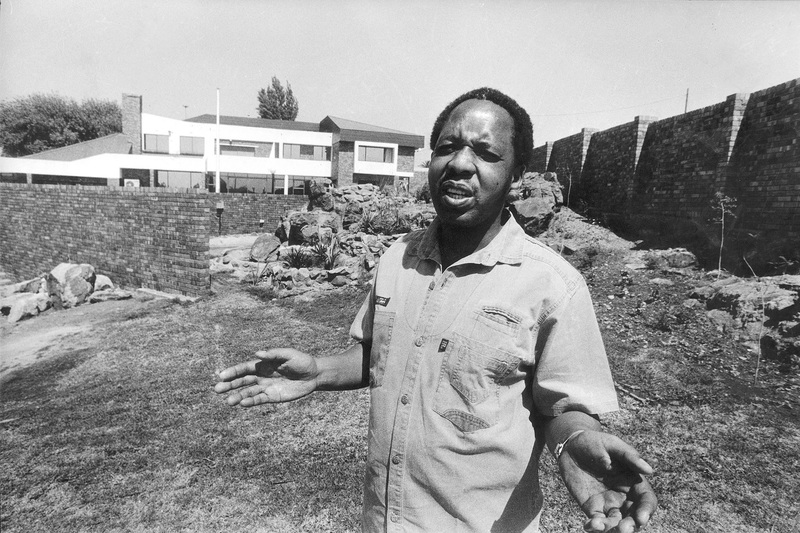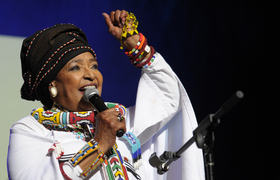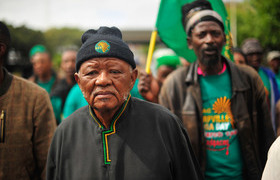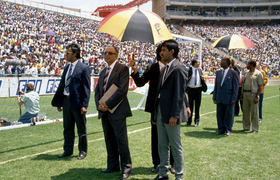The Chris Hani legacy
10 April 2018 | Story Pete van der Woude. Photo Independent Archives. Read time 5 min.
When he was assassinated on 10 April 1993, Chris Hani was the general secretary of the South African Communist Party (SACP) and a member of the National Executive Committee (NEC) of the African National Congress (ANC). He was the leader of uMkhonto weSizwe (MK – the ANC’s military wing), having shown outstanding dedication as its chief of staff during the struggle against apartheid.
Born on 28 June 1942 in a rural village in Cofimvaba, Transkei, Martin Thembisile Hani was one of six children. (He took his nom de guerre, Chris, from one of his brothers.)
Hani became politically aware from a young age thanks to his father, Gilbert, who was active in the ANC. But more than this, Hani was exposed to inequality – and the politics surrounding it – when his father left their rural home to look for work and his mother was left to run their household. When a number of Hani’s school teachers lost their jobs in 1954 after protesting against Bantu education, his political ideals were developed even further.
Matriculating from the Lovedale Institute in the Eastern Cape in 1958, Hani went on to graduate from the University of Fort Hare and Rhodes University in 1961 and 1962 respectively. He claimed that his love of English, Latin and Greek literature only strengthened his hatred of all forms of oppression and persecution.
“He claimed that his love of English, Latin and Greek literature only strengthened his hatred of all forms of oppression and persecution.”
Citing the conviction of ANC leaders in the 1956 Treason Trial as his primary motivation for joining the struggle, Hani becoming a member of the ANC Youth League in 1957. His continuing frustration with the apartheid system and the positive influence of struggle leaders, such as Govan Mbeki, prompted him to join the underground SACP in 1961 and MK in 1962.
Hani was arrested at a police roadblock in 1962 while in possession of pamphlets objecting to the government’s policy of detention without trial. He was subsequently charged under the Suppression of Communism Act and jailed. Granted R500 bail, he entered Botswana to attend the 1962 ANC Conference and was arrested on his return. He was tried and given an 18-month jail sentence.
The Morogoro Conference
In 1963, while out on bail pending an appeal, Hani went underground before leaving the country to undergo military training. He returned in 1967 to take an active role in the Rhodesian bush war. In early 1967 he narrowly escaped into Botswana, only to be arrested and imprisoned for two years for weapons possession.
His imprisonment left him critical of the ANC leadership. He demanded a meeting of all exiled ANC members and, as a result, the Morogoro Conference took place in 1969. At the conference, the decision was made to allow white and other non-Africans to become members of the ANC, and to ensure that political policy guided military action.
After the unbanning of the ANC and SACP on 2 February 1990, Hani returned to South Africa where he campaigned for the SACP in townships around the country. His passionate and charismatic personality soon attracted a cult-like following. Hani’s SACP would have proved a serious match for the ANC in the 1994 elections.
But on 10 April 1993, as he returned to his home in Dawn Park, Boksburg, Hani was assassinated.
His death came at a critical time for South Africa – the assassination helped persuade the members of the Multi-Party Negotiating Forum to finally set a date for South Africa’s first democratic elections.
Chris Hani Lecture Theatre
In recognition of Chris Hani’s contribution to South Africa’s democracy, the University of Cape Town (UCT) will celebrate his life and legacy by renaming the New Science Lecture Theatre the Chris Hani Lecture Theatre.
The official renaming ceremony, to be held on 24 April 2018, will be attended by the Hani family and Deputy Minister of Public Works and Deputy Secretary-General of the SACP Jeremy Cronin, who will give the keynote address.
UCT regards the naming of buildings as a historic moment. It is a change that will not just linger in the name boards on the side of buildings but marks a definitive break with South Africa’s painful past and symbolises an important milestone on our journey as a university.
Visit South African History Online for more details about the life of Chris Hani...
 This work is licensed under a Creative Commons Attribution-NoDerivatives 4.0 International License.
This work is licensed under a Creative Commons Attribution-NoDerivatives 4.0 International License.
Please view the republishing articles page for more information.










